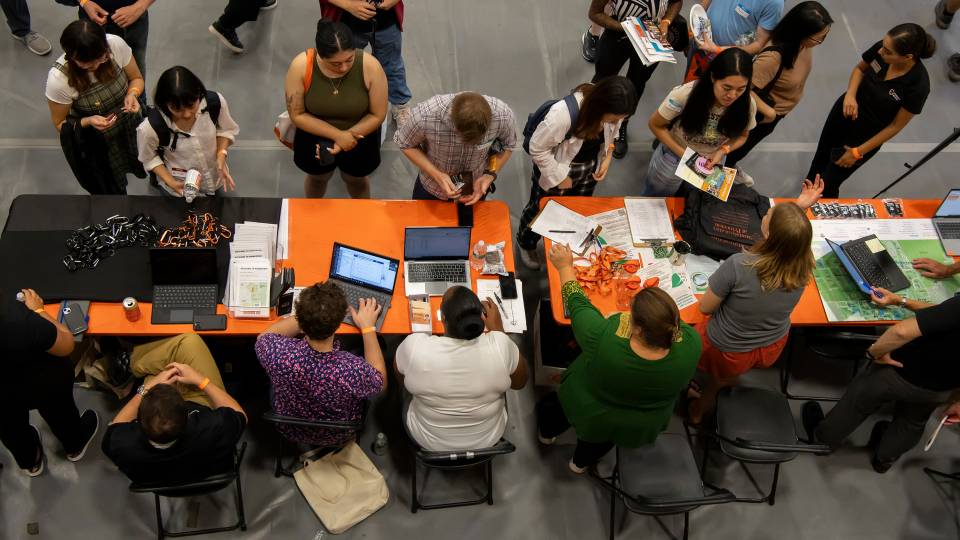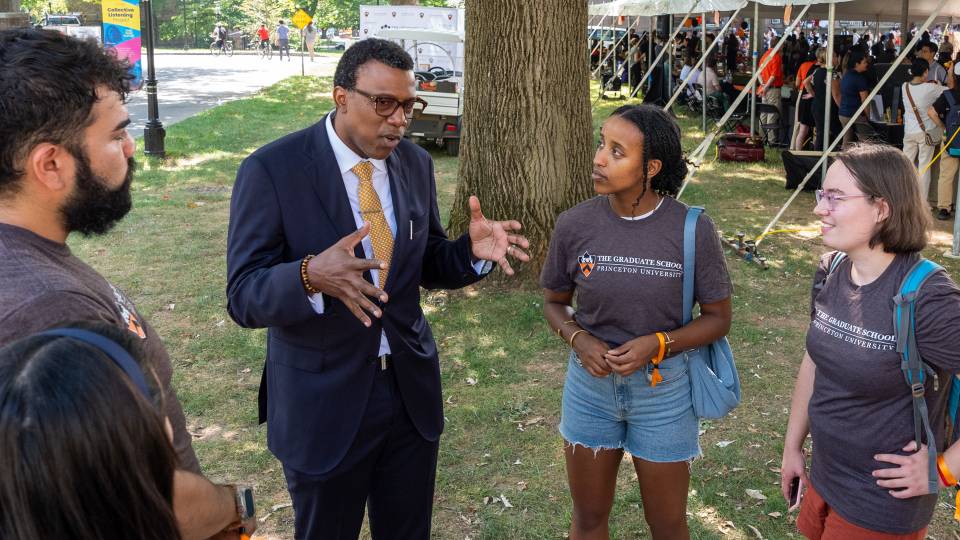Princeton University welcomed 664 graduate students from 62 countries to a new academic year during orientation activities Sept. 10-11. Here, students gather on Alexander Beach for lunch and an information fair.
Emphasizing camaraderie, compassion and community, Princeton University welcomed 664 graduate students from 62 countries to a new academic year during orientation activities Sept. 10-11.
In a keynote address on Monday, Sept. 11, in Richardson Auditorium in Alexander Hall, Princeton President Christopher L. Eisgruber said, "Graduate students are simultaneously talented teachers and critical scholarly partners to our faculty in conducting pathbreaking research."

In his remarks on Monday, Sept. 11, in Richardson Auditorium in Alexander Hall, Princeton President Christopher L. Eisgruber underscored Princeton’s commitment to offering students the best possible graduate school experience.
He underscored Princeton's commitment to offering students the best possible graduate school experience, including "enabling meaningful interaction among undergraduates, graduate students and faculty; launching initiatives that are uniquely cross-disciplinary, service-oriented or international; and promoting interactions among different departments, and among faculty, students and administrators."
During orientation, new students gleaned information about living in Princeton from their senior peers, took guided walking tours around campus and dined together at Procter Dining Hall in the Old Graduate College.
Following Eisgruber's remarks, Cole Crittenden, acting dean of the Graduate School and a 2005 graduate alumnus, welcomed students into the academic community. "Graduate school is where things really do get hard," Crittenden said. "This is the stop where even smart people who sailed through college will, at times, struggle. The whole point of coming to graduate school, especially at a place like Princeton, is to challenge your mind in ways you have never been challenged before."
Mary Bechler, senior associate dean; Aly Kassam-Remtulla, acting associate dean of diversity and inclusion and assistant provost; and Lisa Schreyer, associate dean for student life, detailed the funding, professional, health and social services available to students.
"At Princeton, we strongly believe that demographic and intellectual diversity drives innovation, research and discovery," Kassam-Remtulla said. "It expands our capacity for teaching and learning, and equips us for lives of leadership in an increasingly pluralistic world. The wider the range of perspectives among those working on a problem or issue, the more far-reaching the thinking and innovation."

Cole Crittenden, acting dean of the Graduate School and a 2005 graduate alumnus, welcomes students into the academic community.
"Princeton is your campus, and will be your home for the next two, five or more years," Schreyer said. "You should take this opportunity to engage with all that this campus has to offer."
Students heard from faculty and returning students in the panel Success in Graduate School, which addressed topics including time management, building relationships outside one's department, improving communication and writing skills, and ensuring physical and mental well-being. Panelists included graduate students Jonathan Balkind in computer science, Hendia Edmund in molecular biology, and Amber Zuberi in the Woodrow Wilson School of Public and International Affairs, along with faculty members Rodney Priestley, associate professor of chemical and biological engineering, and Sarah-Jane Leslie, the Class of 1943 Professor of Philosophy, vice dean for faculty development, director of the Program in Linguistics and Program in Cognitive Science, and a 2007 graduate alumna.
Leslie advised students to "know your program and department, know Princeton and know yourselves." At Princeton, you will have many opportunities to reflect on what you want out of life," she said. "Connect with figuring out what sort of career trajectory you want to follow, but also give yourself space to explore."
Priestley advised students to select a dissertation topic they are passionate about because of the time they will need to spend in the lab or library. "I spent many months trying to build new experiments in the lab that did not work," Priestley said, reflecting on his own graduate school experience. "The fact that I was passionate about my topic kept me up at night and kept me interested in the research and the outcome."
Balkind, Edmund and Zuberi stressed the importance of personal connections as well as physical and mental well-being as key to success.
"There are many student groups out there that you can become part of," Balkind said. "And many ways you can do service and give back to the community."
"Evaluate what success really means to you," Edmund advised.

Students hear from faculty and returning students in the panel Success in Graduate School, which addressed topics including time management, building relationships outside one’s department, improving communication and writing skills, and ensuring physical and mental well-being. Panelists included (left to right) Amber Zuberi in the Woodrow Wilson School of Public and International Affairs; Hendia Edmund in molecular biology; Jonathan Balkind in computer science; Rodney Priestley, associate professor of chemical and biological engineering; and Sarah-Jane Leslie, the Class of 1943 Professor of Philosophy, vice dean for faculty development, director of the Program in Linguistics and Program in Cognitive Science, and a 2007 graduate alumna.
Zuberi said that graduate school is not a sprint but a marathon. "You are not going to get through graduate school without understanding how to take care of yourself," she said.
John Cunniff, president of the Association of Princeton Graduate Alumni and a 1988 graduate alumnus, led attendees in a rousing singing of "Old Nassau" with the a capella group Katzenjammers, before students gathered on Alexander Beach for lunch and an information fair.

Students learn about funding, professional, health and social services available at Princeton.
Salvatore Calabrese, in civil and environmental engineering, attended the graduate international orientation at the Davis International Center earlier this week, for information about moving to the United States and adjusting to life at Princeton. "I have learned a lot about social events and campus resources," said Calabrese, who is from Italy.
Kayla Vinson, a student in the Wilson School, spent her lunch exploring the social opportunities available on campus. "It's great to be part of this community, and to see how many diverse things people are doing," she said while signing up for the email newsletter from the Carl A. Fields Center for Equality and Cultural Understanding.
Looking ahead, the students were ready for the afternoon's series of small-group discussions about academic success, diversity and inclusion, and housing and family support.
Erin Flowers, in astrophysical sciences, said orientation helped assuage some of her fears. "I'm really excited to dive into the culture of Princeton," she said.







